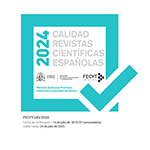The value of autonomy in family interventions
Abstract
Based on the evolution and most notable characteristics of the value of autonomy, its visibility and application are examined in the field of social intervention with families. The particular features presented by family intervention imply a challenge for each of the most settled values in the profession. The main reason is that the family constitutes a group organized by the mediation of moral norms, which often come into conflict with the ethical rights of the individual, within which sphere the realities to which the principle of autonomy alludes are shaped. Taking into account the moral reality represented by family units, various arguments are set forth for a critical review of the principle of autonomy. However, general criteria are advanced that provide a justification for prioritizing the individual’s ethical rights.
The article ends by defending the principle of autonomy: more than a principle, it must be considered as a rule for professional action, depending on the cases and circumstances and within the context of professional ethics governed by the classical virtue of prudence.
Downloads
Article download
License
In order to support the global exchange of knowledge, the journal Cuadernos de Trabajo Social is allowing unrestricted access to its content as from its publication in this electronic edition, and as such it is an open-access journal. The originals published in this journal are the property of the Complutense University of Madrid and any reproduction thereof in full or in part must cite the source. All content is distributed under a Creative Commons Attribution 4.0 use and distribution licence (CC BY 4.0). This circumstance must be expressly stated in these terms where necessary. You can view the summary and the complete legal text of the licence.









